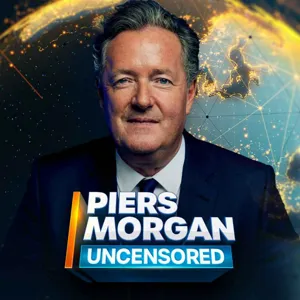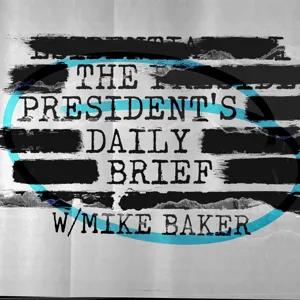Podcast Summary
A Decade-Long Quest for Truth and Justice in Puerto Rico and Beyond: Innovation can flourish in unexpected places, and the pursuit of truth and justice, even in the midst of chaos and war, highlights the resilience of the human spirit
Innovation thrives in unexpected places, such as Puerto Rico, where a rich ecosystem of talent and resources exists for startups and global players alike. Meanwhile, justice, a fundamental pillar of society, can be challenged when order is disrupted, leading to chaos, lies, and even war. In an unforgettable story, journalist Noah Snyder shares his decade-long quest to uncover the truth behind the downing of MH17 and the search for justice for its victims. Through his encounters with a medium and the spirit of a Dutch drummer named Corus Hilder, Snyder explores themes of loss, truth, and the complexities of war and its impact on the world. Ultimately, this tale serves as a reminder of the importance of accountability and the resilience of the human spirit in the face of adversity.
Tragic End to a Holiday in Bali: The shooting down of Malaysia Airlines Flight MH17 in 2014 took the lives of Kors Hilder, his girlfriend Nilsha Toll, and 296 others, including a young pianist and her family. The incident was a result of complex geopolitical tensions between Ukraine and Russia.
The summer of 2014 held excitement and anticipation for Kors Hilder and his girlfriend, Nilsha Toll, as they prepared for a holiday to Bali, but their plans were tragically cut short when Malaysia Airlines Flight MH 17 was shot down over Ukraine, taking the lives of Kors, Nilsha, and 296 other passengers and crew members, including a young pianist named Elsimek de Borss and her family. The event was a shocking reminder of the complex geopolitical tensions that had been simmering in Eastern Europe, as Ukraine had been embroiled in a revolution seeking closer ties to the European Union, which angered Russia's President Vladimir Putin, leading to the annexation of Crimea and a separatist rebellion in the east. The incident also highlighted the unexpected dangers that can come with travel and the fragility of life.
Juxtaposing ordinary belongings with destruction at MH17 crash site: The downing of MH17 highlighted the human cost of conflict and raised questions about accountability, but the complex geopolitical landscape made a clear resolution elusive.
The downing of MH17 was a tragic event that left innocent lives shattered and raised questions about global conflict and accountability. As I traveled to the scene of the crash in Ukraine, I was struck by the juxtaposition of ordinary belongings amidst the destruction. Locals grappled with the inexplicable loss of life and questioned the purpose of continuing to bring children into a world marred by violence. The investigation into the cause of the crash sparked a battle over the truth, with accusations flying between Ukrainian and Western officials and Russian denials. The downing of MH17 had the potential to be a wake-up call for global action against Russian aggression, but the complex geopolitical landscape made a clear resolution elusive. The lives lost on that fateful day serve as a poignant reminder of the human cost of conflict.
International community's weak response to MH17 tragedy: Russia's involvement in MH17 tragedy went unchecked due to the international community's weak response, allowing for continued Russian aggression and human rights abuses.
Despite the downing of MH17 and the involvement of Russian-backed rebels, the international community's response was weak, allowing Russia to continue its advances in Eastern Ukraine and even launch a new gas pipeline with Germany. Igor Girkin, a key player in the conflict, had been requesting heavier weapons and on the day of the tragedy, a Soviet era surface-to-air missile system was delivered from Russia. Despite evidence suggesting Russian involvement, Russia chose to lie and blame Ukraine instead. The international community could have held Russia accountable, but instead, they allowed Russia to obfuscate the truth and continue business as usual. This pattern of weak responses to Russian aggression has continued, allowing for further conflicts and human rights abuses.
MH17 Investigation: Seeking Truth Amidst Propaganda: The MH17 investigation highlights the importance of truth and transparency in the face of propaganda, with a joint team working to recover remains, collect evidence, and determine responsibility.
The MH17 tragedy was shrouded in confusion due to Russia's propaganda campaign, leaving many unanswered questions and doubt about the truth. Amidst the grief and loss, the victims' loved ones placed their faith in the justice system for answers. A joint investigative team was formed to recover remains, collect evidence, and determine responsibility. Alexander Hoog, a Swiss investigator, played a crucial role in the investigation, embodying the idea of a rules-based international order. Despite the progress made, the next steps and the ultimate resolution remain uncertain. The MH17 tragedy serves as a reminder of the importance of truth and transparency in the face of propaganda and confusion.
Documenting the chaos of the Ukrainian conflict: The downing of MH17 was caused by a Buk missile system, and investigations identified those responsible through legal cases.
The downing of Malaysia Airlines Flight MH17 in 2014 was a tragic event that unfolded during the chaos of the conflict in Eastern Ukraine. A monitoring team from the Organization for Security and Cooperation in Europe (OSC) led by Hug, documented the escalating violence, from protests with posters to the use of heavy weapons. On the day of the crash, Hug and his team tried to reach the site to record the events but faced challenges in gaining access. The investigation that followed revealed that the plane was brought down by a 9m314m warhead, likely from a Buk missile system. The Dutch Safety Board's reconstruction of the plane and the distinctive shrapnel found in the wreckage and victims' bodies supported this conclusion. The focus then shifted to identifying those responsible for the attack, leading to several legal cases, including investigations by the Dutch prosecutors, who worked tirelessly to determine individual criminal responsibility.
MH17 Investigation: Piecing Together Evidence from Various Sources: Open source intel, witness testimonies, and international cooperation played crucial roles in solving the MH17 investigation despite the lack of access to the crime scene.
The MH17 investigation was a complex case that required piecing together evidence from various sources due to the inability to access the crime scene. Open source intelligence, such as social media and satellite images, played a significant role but needed validation. Witness testimonies, including those from separatist fighters, were crucial in building the case against four individuals charged with murder in 2019. The investigation also highlighted the contrasting values of order and justice between Dutch society and Putin's Russia. For Deputy Chief Prosecutor Dichna von Busselaer, who led the investigation and had a personal connection to the case, it was a reminder of the importance of organizing the world and seeking truth and justice.
Trial of MH17 suspects in absentia: The trial brought closure to victims' families but practical implications were limited due to suspects' absence in Russia or Russian-occupied territories. It underscores challenges of enforcing international justice and importance of independent judicial systems.
The trial of Irkin, Dubinsky, Gherkin, and Kharshenka for their involvement in the downing of MH17 in 2000 took place in absentia as they were all in Russia or Russian-occupied territories. The Dutch court found them guilty and sentenced Gherkin, Dubinsky, and Kharshenko to life in prison, but they are unlikely to serve the sentence. The trial brought some closure to the victims' families, but it could not fill the void left by their loss. Justice was served symbolically, but the practical implications were limited. The case highlights the challenges of enforcing international justice, particularly when it comes to countries like Russia that do not extradite their citizens. The trial also underscores the importance of independent judicial systems and the role they can play in holding individuals accountable for their actions, even if the consequences may not be immediate or complete.
Trial of MH17 downing responsible parties: Importance of upholding rule of law: The trial of those responsible for MH17 downing highlights the significance of maintaining the rule of law in international aviation, while leaving unanswered questions about Russian involvement. Ukraine's pursuit of justice has crucial implications for its future as a reliable EU partner and a nation committed to the rule of law.
The trial of those responsible for the downing of MH17 is a reminder of the importance of upholding the rule of law in a global system where thousands of planes safely travel daily. However, the verdict leaves many unanswered questions, particularly regarding the involvement of Russian President Vladimir Putin. With over 100,000 cases of war crimes in Ukraine, the legal process is crucial for Ukraine's future as a reliable EU partner and a nation committed to the rule of law. Despite the challenges, investigators remain hopeful that the answers to these crimes can be found in Russia, and that justice will eventually prevail, even if it takes patience and endurance.
Exploring peace and justice in the wake of MH17 and ongoing conflicts: The downing of MH17 and ongoing conflicts in Ukraine highlight the importance of pursuing peace and justice, with recent developments including Putin's war crimes charge and individuals focusing on MH17-related matters. Despite challenges, there's hope for progress towards a more peaceful global order.
The investigation into the downing of MH17 continues, with Putin charged with war crimes and others facing consequences for their actions. However, despite these developments, the ongoing conflict in Ukraine and the fragility of global order remain pressing concerns. Igor Gherkin was found guilty of inciting extremism, while Hans de Borst, father of a victim, left his job to focus on MH17-related matters. Meanwhile, Vast Contenance, Core's band, continues to create music, and the world prepares for numerous elections in 2024 where peace could be on the ballot. The new season of "Things That Go Boom" explores this theme further. Despite the challenges, there's a glimmer of hope that progress can be made towards peace and justice.






